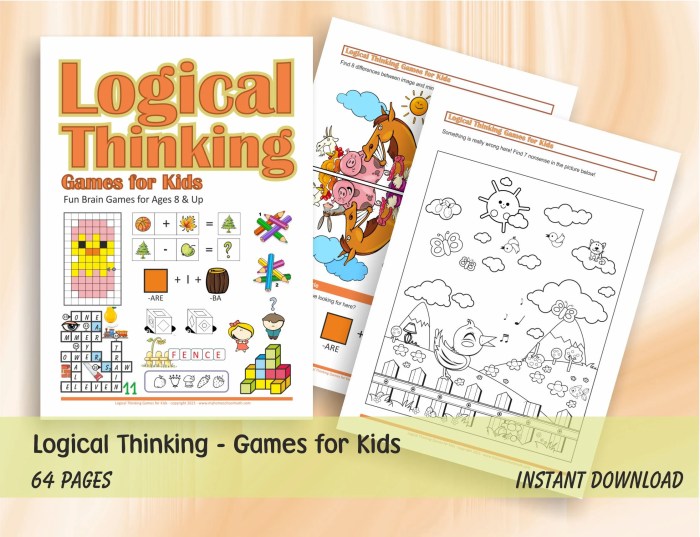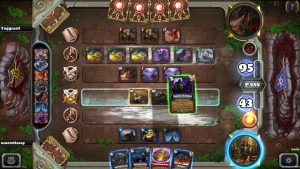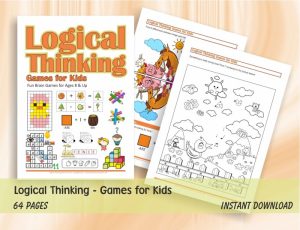
Logical reasoning is a fundamental skill that underpins our ability to think critically, solve problems, and make informed decisions. It’s not just about academic success; it’s about navigating the complexities of everyday life. From deciphering instructions to analyzing arguments, logical reasoning empowers us to make sense of the world around us. Educational games provide a fun and engaging way to cultivate these crucial cognitive skills, making learning both enjoyable and effective.
This article delves into the exciting world of educational games designed to foster logical reasoning. We’ll explore various game types, discuss their benefits, and provide recommendations for finding the right games for different age groups. Whether you’re a parent seeking engaging activities for your child or an educator looking for innovative teaching tools, this guide will equip you with the knowledge and resources to harness the power of games for logical reasoning development.
Understanding Logical Reasoning
Logical reasoning is a crucial skill in education, empowering individuals to think critically, solve problems effectively, and make informed decisions. It’s not just about academics; it’s a valuable life skill that helps us navigate everyday situations and make sense of the world around us.
Importance of Logical Reasoning in Education
Logical reasoning is a fundamental aspect of learning and plays a vital role in various academic disciplines. It enables students to:
- Analyze information: Logical reasoning helps students break down complex information into smaller, manageable parts, identify key concepts, and understand the relationships between different pieces of information.
- Solve problems: By applying logical reasoning, students can identify the root cause of problems, develop effective solutions, and evaluate the potential outcomes of different approaches.
- Formulate arguments: Logical reasoning is essential for constructing strong arguments, presenting evidence, and justifying conclusions. Students learn to identify fallacies, evaluate the validity of claims, and build persuasive arguments.
- Think critically: Logical reasoning fosters critical thinking skills, allowing students to question assumptions, evaluate information from different perspectives, and form their own informed opinions.
Examples of Logical Reasoning in Everyday Life
Logical reasoning is not confined to classrooms; it’s a skill we use every day in various situations, including:
- Decision-making: When choosing between different options, we use logical reasoning to weigh the pros and cons, assess risks and benefits, and make the most rational choice.
- Problem-solving: Whether it’s fixing a broken appliance, navigating a traffic jam, or planning a trip, we apply logical reasoning to identify the problem, break it down into smaller parts, and find solutions.
- Communication: Logical reasoning helps us understand the arguments of others, identify inconsistencies in their logic, and present our own ideas in a clear and persuasive manner.
- Critical thinking: In our daily lives, we encounter information from various sources, and logical reasoning helps us evaluate the credibility of these sources, identify biases, and form our own judgments.
Definition of Logical Reasoning
Logical reasoning is the process of using a set of known facts or premises to reach a conclusion. It involves:
- Identifying premises: These are the starting points of a logical argument, the facts or assumptions that are considered true.
- Applying rules of inference: These are logical principles that govern how we can draw conclusions from premises. Examples include deductive reasoning (drawing a certain conclusion from a set of premises) and inductive reasoning (drawing a probable conclusion based on observed patterns).
- Reaching a conclusion: The conclusion is the statement that is derived from the premises using the rules of inference.
Logical reasoning is a fundamental cognitive skill that allows us to understand and navigate the world around us. It is essential for academic success, problem-solving, decision-making, and critical thinking.
Types of Educational Games for Logical Reasoning

Educational games can be a fun and engaging way to learn and improve logical reasoning skills. There are many different types of games that can be used to develop these skills, each with its own unique benefits and drawbacks.
Categorizing Educational Games for Logical Reasoning
Here are some of the most common types of educational games that can be used to foster logical reasoning skills:
- Puzzle Games: These games challenge players to solve problems by using logic and deduction. Examples include Sudoku, KenKen, and logic puzzles. Puzzle games are great for developing problem-solving skills, spatial reasoning, and pattern recognition.
- Strategy Games: These games require players to think ahead and plan their moves strategically. Examples include chess, checkers, and Go. Strategy games can help develop critical thinking, planning, and decision-making skills.
- Deduction Games: These games involve using clues and logic to solve a mystery or identify a suspect. Examples include Clue, Sherlock Holmes Consulting Detective, and many escape room games. Deduction games can help develop critical thinking, analytical skills, and attention to detail.
- Coding Games: These games teach players the basics of computer programming through interactive puzzles and challenges. Examples include Code.org, Scratch, and Minecraft. Coding games can help develop logical thinking, problem-solving, and computational skills.
- Role-Playing Games (RPGs): These games allow players to create characters and make decisions that affect the outcome of the game. Examples include Dungeons & Dragons, Skyrim, and Fallout. RPGs can help develop critical thinking, decision-making, and problem-solving skills in a creative and engaging way.
Benefits and Drawbacks of Educational Games
Educational games offer several benefits for developing logical reasoning skills. They can:
- Make learning fun and engaging: Games can be a more enjoyable way to learn than traditional methods, which can lead to increased motivation and engagement.
- Provide opportunities for practice: Games often involve repetition, which can help solidify logical reasoning skills.
- Promote critical thinking: Games can challenge players to think critically and solve problems in creative ways.
- Develop problem-solving skills: Games often require players to use logic and deduction to overcome challenges.
- Enhance spatial reasoning: Some games, such as puzzle games and strategy games, can help develop spatial reasoning skills.
However, there are also some potential drawbacks to using educational games:
- Limited depth of learning: Some games may not provide sufficient depth of learning in a particular subject or skill.
- Potential for addiction: Some games can be highly addictive, which can lead to excessive screen time and other problems.
- Cost: Some educational games can be expensive, especially if they require specialized equipment or subscriptions.
Table of Game Types and Reasoning Skills
Here is a table summarizing different types of educational games and the reasoning skills they can foster:
| Game Type | Reasoning Skills |
|---|---|
| Puzzle Games | Problem-solving, spatial reasoning, pattern recognition |
| Strategy Games | Critical thinking, planning, decision-making |
| Deduction Games | Critical thinking, analytical skills, attention to detail |
| Coding Games | Logical thinking, problem-solving, computational skills |
| Role-Playing Games (RPGs) | Critical thinking, decision-making, problem-solving |
Online Games for Logical Reasoning

The digital age has opened up a world of possibilities for learning and development, and logical reasoning is no exception. Numerous online games are designed to engage players in challenging puzzles and scenarios, fostering critical thinking and problem-solving skills. These games cater to a wide range of ages and abilities, making them a valuable tool for enhancing logical reasoning abilities.
Popular Online Games for Logical Reasoning
Online games offer a fun and interactive way to sharpen logical reasoning skills. Many popular games have built-in features that encourage players to think critically and strategically. Here are some popular examples:
- Sudoku: This classic number-placement puzzle requires players to fill a 9×9 grid with digits so that each column, row, and 3×3 subgrid contains all the digits from 1 to 9. Sudoku challenges players to use deductive reasoning and pattern recognition to arrive at the solution.
- Chess: This strategy game involves two players who move pieces across a checkered board, with the goal of capturing the opponent’s king. Chess requires players to plan ahead, anticipate their opponent’s moves, and make logical decisions based on the current state of the game.
- Logic Puzzles: Numerous online platforms offer a variety of logic puzzles, including riddles, logic grids, and deduction games. These puzzles often present players with a set of clues and require them to use logical reasoning to solve the puzzle.
- Minecraft: While primarily a creative sandbox game, Minecraft also encourages logical thinking and problem-solving. Players need to gather resources, build structures, and overcome challenges, all of which require strategic planning and logical decision-making.
- Portal 2: This puzzle game challenges players to use physics and logic to navigate through a series of chambers. Players must think creatively and apply logical principles to solve puzzles and progress through the game.
Comparing and Contrasting Online Games
Online games for logical reasoning vary in their features, gameplay, and difficulty levels. Some key considerations include:
- Gameplay Mechanics: Games can differ in their rules, objectives, and how players interact with the game world. For example, Sudoku focuses on number placement, while Chess involves strategic movement of pieces.
- Difficulty Levels: Most games offer multiple difficulty settings, allowing players to adjust the challenge to their skill level. This helps ensure that players are appropriately challenged and can progress at their own pace.
- Visual and Audio Design: Games can vary in their visual and audio aesthetics, which can influence the overall experience. Some games use vibrant colors and engaging sound effects, while others opt for a more minimalist approach.
- Social Features: Some online games allow players to compete against others, either in real-time or asynchronously. This can add an element of social interaction and competition to the gameplay.
Organizing Online Games by Age and Difficulty
Online games for logical reasoning are often categorized by age appropriateness and difficulty level. This helps parents, educators, and players choose games that are suitable for their needs.
- Early Childhood (Ages 4-7): Games for this age group typically focus on basic logic skills, such as matching, sorting, and sequencing. Examples include simple puzzle games, matching games, and interactive storybooks with logic-based activities.
- Elementary School (Ages 8-12): Games for this age group introduce more complex logical concepts, such as problem-solving, critical thinking, and spatial reasoning. Examples include logic puzzles, strategy games, and coding games.
- Middle and High School (Ages 13-18): Games for this age group often involve advanced logical reasoning skills, such as deductive reasoning, inductive reasoning, and abstract thinking. Examples include complex puzzle games, strategy games, and simulation games.
- Adults: Online games for adults can be highly challenging and require advanced logical reasoning abilities. Examples include complex logic puzzles, strategy games, and puzzle games with a high level of difficulty.
Exploring Other Game Genres
Logical reasoning is a crucial skill for navigating the complexities of life, and educational games have emerged as powerful tools to cultivate this ability. While puzzle and logic games are often the first that come to mind, other genres offer a surprisingly rich landscape for fostering critical thinking and problem-solving.
Adventure Games
Adventure games, often featuring immersive narratives and intricate puzzles, provide an excellent platform for developing logical reasoning. By navigating challenging environments, deciphering cryptic clues, and solving puzzles, players learn to think strategically, analyze information, and make logical deductions.
- The Legend of Zelda Series: This classic franchise, known for its engaging storylines and challenging dungeons, requires players to solve environmental puzzles, navigate mazes, and utilize items strategically, fostering logical thinking and problem-solving skills.
- The Monkey Island Series: These humorous adventure games emphasize puzzle-solving, requiring players to interact with the environment, gather information, and use logic to overcome obstacles, promoting critical thinking and decision-making.
- The Walking Dead Series: This episodic adventure game series features a compelling narrative with moral dilemmas and challenging decisions, encouraging players to think critically about consequences and make logical choices in a complex world.
Anime Games
Anime games, often inspired by popular anime series, can incorporate elements of logical reasoning into their gameplay. These games can feature puzzles, strategy elements, or decision-making scenarios that require players to analyze information and make logical choices.
- Persona 5 Royal: This JRPG features a complex turn-based combat system that rewards strategic thinking and logical decision-making. Players need to analyze enemy weaknesses, exploit vulnerabilities, and plan their attacks strategically, fostering logical reasoning and problem-solving skills.
- Fire Emblem: Three Houses: This tactical RPG combines turn-based combat with relationship-building and decision-making. Players need to strategize battles, deploy units effectively, and make choices that impact the story and relationships, promoting logical thinking and planning.
- Steins;Gate: This visual novel features a complex narrative with time travel and scientific concepts, requiring players to analyze information, make logical deductions, and choose actions that affect the story’s outcome, fostering critical thinking and problem-solving.
Arcade Games
Arcade games, traditionally known for their fast-paced action and simple gameplay, can also be designed to promote logical reasoning. Games that require players to think strategically, plan their moves, and make quick decisions can encourage logical thinking and problem-solving.
- Tetris: This classic puzzle game requires players to rotate and drop falling blocks to form complete lines, encouraging spatial reasoning, pattern recognition, and logical thinking.
- Puyo Puyo Tetris: This game combines the puzzle elements of Tetris with the fast-paced action of Puyo Puyo, requiring players to strategize, plan their moves, and make quick decisions, promoting logical reasoning and problem-solving.
- PAC-MAN: While seemingly simple, PAC-MAN requires players to navigate mazes, avoid ghosts, and strategize their movements, promoting spatial reasoning, pattern recognition, and logical thinking.
Strategy Games
Strategy games, often emphasizing resource management, planning, and tactical decision-making, provide a fertile ground for cultivating logical reasoning. Players need to analyze situations, anticipate outcomes, and make strategic choices based on logical deductions.
- Civilization VI: This turn-based strategy game requires players to manage resources, build civilizations, engage in diplomacy, and wage war, fostering logical reasoning, strategic planning, and long-term thinking.
- StarCraft II: This real-time strategy game challenges players to build bases, manage resources, and control armies in fast-paced battles, promoting logical reasoning, strategic planning, and quick decision-making.
- XCOM 2: This turn-based strategy game focuses on tactical combat, requiring players to plan their moves, utilize cover, and exploit enemy weaknesses, fostering logical reasoning, strategic planning, and problem-solving skills.
In conclusion, educational games offer a powerful and engaging approach to developing logical reasoning skills. By incorporating these games into learning experiences, we can empower individuals with the critical thinking, problem-solving, and decision-making abilities necessary to thrive in a complex and ever-changing world. As we continue to explore the intersection of education and technology, the role of educational games in shaping cognitive development will only continue to grow.
FAQ Insights
What are some examples of educational games that promote logical reasoning?
Popular examples include Sudoku, chess, logic puzzles, and strategy games like “Civilization” or “StarCraft.” These games challenge players to think strategically, analyze patterns, and make informed decisions.
How can I incorporate educational games into my child’s learning?
Start by observing your child’s interests and choosing games that align with their age and abilities. Make it a fun family activity, playing together and discussing strategies. You can also encourage your child to play with friends or classmates, fostering collaboration and communication.
Are there any online resources for finding educational games?
Yes, there are numerous websites and apps dedicated to educational games. Some popular platforms include Khan Academy, Lumosity, and BrainHQ. These resources offer a wide variety of games, tailored to different age groups and learning objectives.





